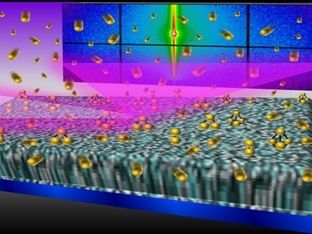Scientists show there's nothing boring about watching paint dry
It turns out that watching paint dry might not be as boring as the old adage claims. A team led by Yale University researchers has come up with a new technique to study the mechanics of coatings as they dry and peel, and has discovered that the process is far from mundane.
In the August 9-13 edition of the Proceedings of the National Academy of Sciences, the team presents a new way to image and analyze the mechanical stress that causes colloidal coatings—those in which microscopic particles of one substance are dispersed throughout another—to peel off of surfaces.
Understanding how and why coatings fail has broad applications in the physical and biological sciences, said Eric Dufresne, the John J. Lee Associate Professor of Mechanical Engineering at Yale and lead author of the study.
"Coatings protect almost every surface you encounter, from paint on a wall to Teflon on a frying pan to the skin on our own bodies. When coatings peel and crack they put the underlying material at risk," Dufresne said. "Our research is aimed at pinpointing the failure of coatings. We've developed this new technique to zoom in on coatings and watch them fail at the microscopic level."
To visualize the microscopic motion of paint in 3D, the team mixed in tiny fluorescent particles that glow when illuminated by a laser. By tracing the motion of these particles over time with a microscope, they captured the motion of the paint as it peeled and dried in detail.
In addition, the team was able to track the 3-D forces generated by the paint as it dried, producing a "stress map" of the mechanical deformation of the coating as it failed. "The trick was to apply the paint to a soft surface, made of silicone rubber, that is ever so slightly deformed by the gentle forces exerted by the drying paint," Dufresne said.
Although the current study focuses on colloidal coatings, the technique could be applied to all kinds of coatings, Dufresne said. Next, the team hopes to improve on current methods for mitigating peeling in a wide range of coatings.
"This is a completely new way of looking at a very old problem."
Most read news
Other news from the department science

Get the analytics and lab tech industry in your inbox
By submitting this form you agree that LUMITOS AG will send you the newsletter(s) selected above by email. Your data will not be passed on to third parties. Your data will be stored and processed in accordance with our data protection regulations. LUMITOS may contact you by email for the purpose of advertising or market and opinion surveys. You can revoke your consent at any time without giving reasons to LUMITOS AG, Ernst-Augustin-Str. 2, 12489 Berlin, Germany or by e-mail at revoke@lumitos.com with effect for the future. In addition, each email contains a link to unsubscribe from the corresponding newsletter.





















































